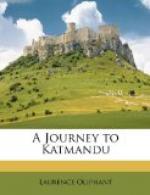This collection of temples is surrounded by rickety old houses, inhabited by Bhootyas and priests. All around small images sit upon wet stones, holding in their hands everlasting tapers, and look out of their niches upon the dirty worshippers who smother them with faded flowers. Turning our backs upon these little divinities, we obtained the first panoramic view we had yet had of the valley and city of Katmandu.
The valley is of an oval shape; its circumference is nearly 50 miles, and the hills by which it is enclosed vary from one to two thousand feet in height. Sheopoorie, the most lofty of these, is clothed to the summit with evergreen jungle, and rises abruptly behind the town. Behind it the fantastically shaped Jib Jibia shows its craggy summit thickly powdered with snow, while the still loftier Gosain-Than, at a distance of about 30 miles, rears its ever white and glittering peak to a height of 25,000 feet, and seems majestically to preside over this glorious scene.
The town of Katmandu, situated at the junction of the Bhagmutty and Bishmutty, and containing a population of 50,000 inhabitants, lay spread at our feet, and we could discern the passengers on the narrow fragile-looking bridges which span the two rivers, at this time containing scarcely any water. Innumerable temples, Bhuddist and Hindoo, and mixtures of both, occupied hillocks, or were situated near the sacred fonts or groves with which the valley abounds, and which adds much to the beauty of its appearance. The number of the edifices affords strong proof of the superstition of the people, and warrants the remark of Colonel Kirkpatrick, who says that there seem to be in Nepaul as many shrines as houses, and as many idols as inhabitants.
A tradition is current in Nepaul that the valley of Katmandu was at some former period a lake, and it is difficult to say in which character it would have appeared the most beautiful. The knolls, wooded or terraced, with romantic old Newar towns crowning their summits,—the five rivers of the valley winding amongst verdant meadows,—the banks here and there precipitous, where the soft clayey soil had yielded to the action of the torrent in the rains,—the glittering city itself,—the narrow paved ways leading between high hedges of prickly pear,—the pagodas and temples studded in all directions, presented a scene as picturesque and perhaps more interesting than would have been afforded by the still lake embedded in wild mountains, and frowned upon by snow-capped peaks; while the richly cultivated knolls in the valley formed fertile islands, the luxuriant vegetation of which would have softened the scene into one of exquisite beauty.
Whether the rich and wonderfully prolific soil of the valley is the alluvial deposit of this lake, I cannot say, but there is no doubt that, whatever may be the cause, the valley of Nepaul is almost unrivalled in its fertility, supporting as it does in comfort and plenty a population of 400,000 inhabitants, being 300 persons to the square mile.




